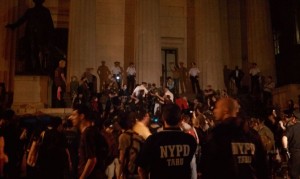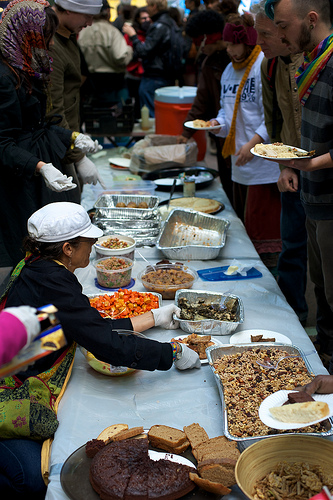In his new book Gaga Feminism, queer theorist and activist Jack Halberstam calls for a new gaga feminism, represented by Lady Gaga, that is epitomized by
a politics of free-falling, wild thinking and imaginative reinvention.
It’s an “undoing” that Halberstam suggests might lead us to “occupy gender.” This isn’t a review of the book, because I’ve only just started it. It’s a riff on the possibility of such wilding in the debt society.
One of the reasons Occupy was so surprising to city authorities, especially in New York, is the successful containment of the possibility of “undoing,” a term also used by Gramsci to refer to spontaneous popular revolt. Would today’s NYPD allow a situation like Stonewall to unfold? Would ACT UP be able to stage a die-in on Wall Street, and, if so, would anyone notice? We know the answer that one: ACT UP were fully involved in the Occupy Anniversary and no mainstream reporting resulted.
I live in Greenwich Village as a bonus part of my work. When I arrived here nearly a decade ago, some traces of a more resistant urban space could be seen. But The Little Red Schoolhouse, the “left” school at the end of Bleecker Street turned out to want $27,000 a year in tuition. Now it’s $35,000, somewhat higher than Harvard. The sign for the Village Gate Theater is still there but it actually closed in 1993. The Beat coffee houses like Le Figaro are closed and today punk venue Kenny’s Castaways shut. The Chelsea piers that once were a genuinely wild urban site are a frequently patrolled park.
Bleecker Street today visualizes the debt society. Between Laguardia Place and 6th Avenue alone, there are branches of Chase, Bank of America and Capital One. Every time rents go up, and that is often, another space becomes a nail salon, a fast food outlet or a pharmacy. The endless pharmacies all prosper on the medicalization of everything, the non-stop stream of prescriptions that are less and less often covered by insurance. Workers in nail salons rent their space from the owner of the store, meaning that every day they begin work in debt.
So when Halberstam suggests that it’s children under eight, women over 45 and
the vast armies of the marginalized, the abandoned and the unproductive
that are those best-suited to perform gaga wildness, he’s also measuring the margins of the debt society. A year ago when the Occupy Student Debt Campaign was created, debt refusal, or wilding debt, was a outlier position. On October 13, there will be debt refusal protests from Athens to Paris, Madrid, Mexico City, New York and Rome, to name a few. Wilding is happening.




